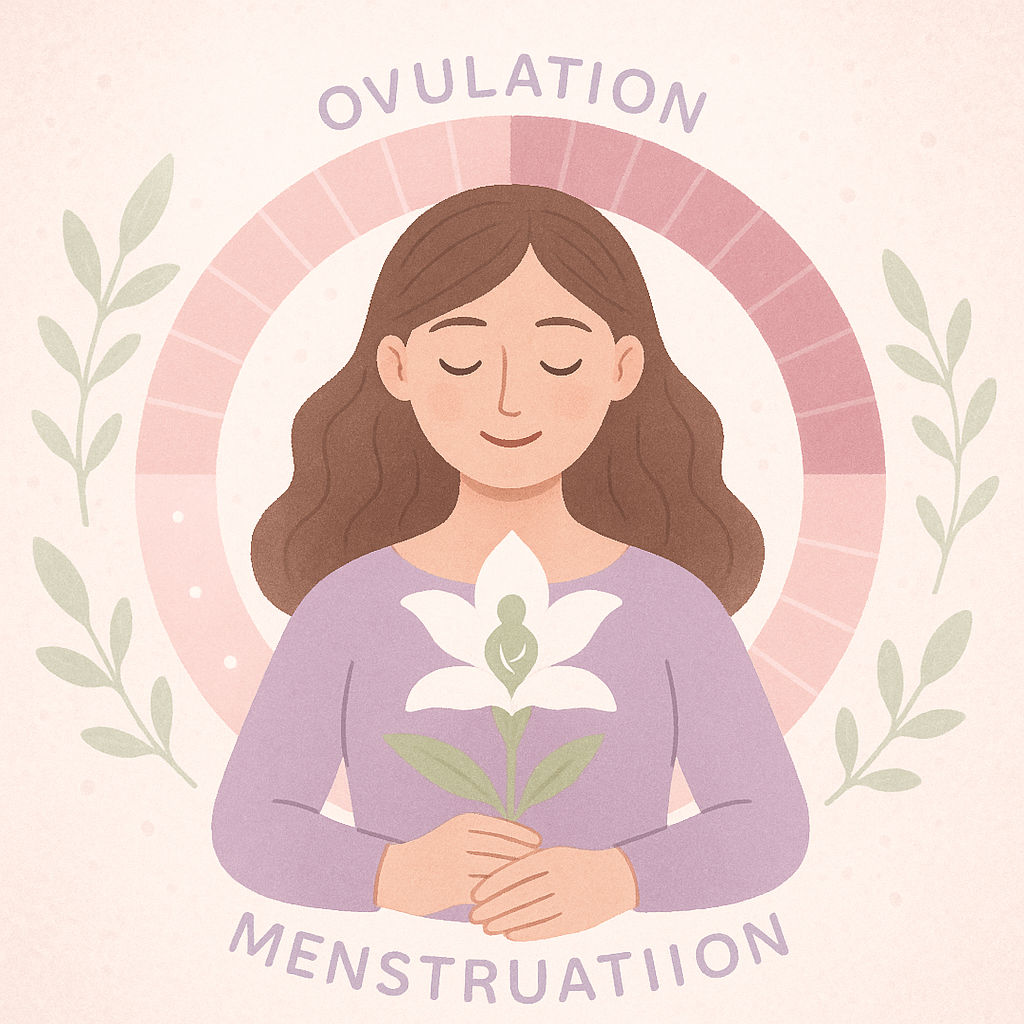Menstruation is often seen as just a monthly inconvenience, but in reality, your menstrual cycle is a powerful indicator of fertility and reproductive health. A healthy cycle doesn’t just mean predictable periods—it reflects balanced hormones, regular ovulation, and overall well-being. On the other hand, irregular cycles can be a sign of deeper health issues that may affect your ability to conceive.
This comprehensive guide explores how menstrual health is linked to fertility, the role of hormones, common problems, lifestyle influences, and ways to improve both naturally.
🔹 Why Menstrual Health Matters for Fertility
Menstrual health isn’t just about bleeding every month—it’s a biological rhythm that shows how well your reproductive system is working. When your cycle is regular:
- ✅ You are more likely to ovulate consistently.
- ✅ Hormones like estrogen and progesterone stay balanced.
- ✅ The uterus prepares properly for embryo implantation.
- ✅ The chances of conceiving naturally are much higher.
👉 In short, healthy menstrual cycles = higher fertility.
🔹 Anatomy of the Menstrual Cycle & Fertility
Your menstrual cycle is divided into four key phases, each playing a critical role in reproduction:
1. Menstrual Phase (Day 1–5) 🩸
- The uterine lining sheds, leading to menstrual bleeding.
- Hormone levels (estrogen and progesterone) are low.
- Follicle-stimulating hormone (FSH) begins to rise, preparing new eggs.
Fertility link: This phase resets your body for the next chance of conception.
2. Follicular Phase (Day 1–13) 🌱
- FSH stimulates follicles in the ovaries to grow.
- Estrogen increases, thickening the uterine lining.
- Only one dominant follicle matures to release an egg.
Fertility link: Proper follicle growth ensures a healthy, mature egg for ovulation.
3. Ovulation Phase (Around Day 14) 🥚✨
- Triggered by a surge in luteinizing hormone (LH).
- A mature egg is released into the fallopian tube.
- Fertile cervical mucus appears (clear, stretchy, egg-white consistency).
Fertility link: This is the most fertile window (5 days before and 1 day after ovulation).
4. Luteal Phase (Day 15–28) 🌸
- The empty follicle (corpus luteum) produces progesterone.
- Progesterone stabilizes the uterine lining for implantation.
- If pregnancy doesn’t occur, hormone levels drop, leading to menstruation.
Fertility link: A strong luteal phase supports early pregnancy. A short or weak luteal phase can cause early miscarriage.
🔹 Signs of Healthy Menstrual Health 🌸
A well-functioning cycle supports fertility and signals hormonal balance. Look for:
- Regular cycles (21–35 days) ⏳
- Periods lasting 3–7 days 💧
- Moderate flow (30–80 ml) 🩸
- Ovulation signs (clear stretchy mucus, mild ovulation pain) 🌟
- Mild PMS symptoms only
- Consistent cycle lengths month to month
If these signs are present, your body is likely ovulating regularly and ready for conception.
🔹 Common Menstrual Problems That Affect Fertility 🚫
Not all cycles run smoothly. Here are the main menstrual irregularities linked with infertility:
1. Irregular Periods
- Cycles shorter than 21 days or longer than 35.
- Often caused by PCOS, thyroid issues, or excessive stress.
2. No Ovulation (Anovulation)
- Occurs in 1 in 10 women with infertility.
- Causes: PCOS, thyroid imbalance, obesity, excessive exercise.
3. Polycystic Ovary Syndrome (PCOS)
- Affects 1 in 5 women worldwide.
- Causes irregular ovulation, cysts, and hormonal imbalance.
4. Endometriosis
- Uterine tissue grows outside the uterus.
- Leads to painful periods, infertility, and inflammation.
5. Fibroids & Polyps
- Non-cancerous growths inside the uterus.
- Can block implantation or cause heavy bleeding.
6. Primary Ovarian Insufficiency (POI)
- Early menopause before age 40.
- Causes infertility and hormone imbalance.
🔹 How Lifestyle Affects Menstrual Health & Fertility 🌱
Your daily habits have a direct impact on your cycle and ability to conceive:
🥗 Nutrition
- Iron-rich foods (spinach, lentils) prevent anemia.
- Folate, vitamin D, and zinc support ovulation.
- Omega-3s (salmon, flaxseeds) improve egg quality.
- Avoid junk food, processed sugar, and trans fats.
🏋️ Exercise
- Moderate activity like walking, yoga, or swimming helps regulate hormones.
- Over-exercising can stop ovulation (common in athletes).
😴 Sleep
- 7–9 hours of quality sleep is essential.
- Poor sleep disrupts reproductive hormones.
🧘 Stress Management
- Stress raises cortisol, which blocks ovulation.
- Relaxation methods: meditation, journaling, breathing exercises.
🚭 Smoking & Alcohol
- Smoking reduces egg quality and speeds up ovarian aging.
- Excess alcohol disrupts hormones and harms fertility.
🔹 Improving Menstrual Health for Better Fertility 🌟
Here are natural and medical ways to support your reproductive system:
Natural Tips 🌿
- Track your cycle with apps 📱 or a diary.
- Monitor basal body temperature 🌡️ for ovulation.
- Eat a fertility-friendly diet rich in antioxidants.
- Maintain a healthy BMI.
- Stay hydrated 💧.
Medical Options 💊
- Fertility treatments (clomiphene, IVF, IUI).
- Hormone therapy for thyroid or progesterone issues.
- Laparoscopy for endometriosis or fibroids.
- Supplements prescribed by a doctor (CoQ10, folic acid).
🔹 When to Seek Medical Help 🩺
Consult a gynecologist if:
- Your periods are absent for 3+ months.
- You have extreme pain or heavy bleeding.
- You’re trying to conceive for 12 months (or 6 months if 35+).
- You notice severe PMS, mood swings, or fatigue.
📊 Comparison Table: Healthy vs. Unhealthy Cycles
| Aspect | Healthy Cycle 🌸 | Unhealthy Cycle 🚫 |
|---|---|---|
| Cycle Length | 21–35 days | <21 or >35 days |
| Flow | Moderate, 3–7 days | Very light or heavy |
| Ovulation | Predictable, monthly | Absent or irregular |
| Pain | Mild cramps only | Severe, disabling pain |
| Mood & Energy | Stable | Extreme swings, fatigue |
🙋 FAQs on Menstrual Health & Fertility
Q1: Does irregular menstruation mean infertility?
Not necessarily. Many women with irregular cycles still conceive, but it may take longer. Identifying the cause improves chances.
Q2: Can I get pregnant if I don’t ovulate regularly?
Conception requires ovulation. Treatments like ovulation-inducing medications can help.
Q3: Is painful menstruation linked to infertility?
Severe pain may signal endometriosis or fibroids, which can affect fertility.
Q4: What age does fertility start to decline?
Fertility peaks in the 20s, starts declining after 30, and drops significantly after 35.
Q5: Can lifestyle changes restore regular periods?
Yes! Diet, exercise, stress management, and sleep can regulate cycles naturally in many women.
Q6: Can birth control affect fertility long-term?
No. Most women regain normal fertility within a few months after stopping birth control.
✅ Final Thoughts
Menstrual health is the foundation of fertility. A regular, balanced cycle means your body is ovulating, your hormones are stable, and your uterus is prepared for pregnancy. On the other hand, irregularities may signal deeper issues like PCOS, thyroid imbalance, or endometriosis, which can affect fertility if left untreated.
By combining healthy lifestyle choices, cycle tracking, and medical support when needed, women can maximize their chances of conception and maintain long-term reproductive health. 🌸💖





